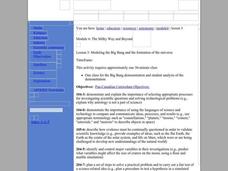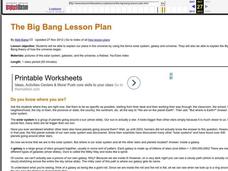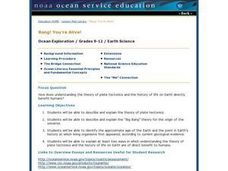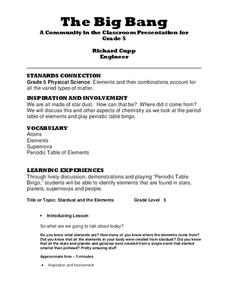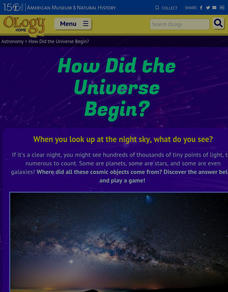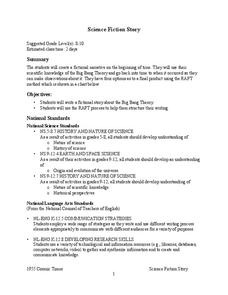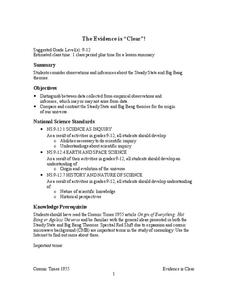Alabama Learning Exchange
The Big Bang Theory: An Evidence-Based Argument
What evidence supports the big bang theory? Individuals analyze scholarly resources about the the theory and develop arguments backed by evidence. They brainstorm, share ideas, watch a video, and read articles to complete a graphic...
School Science
The Big Bang Time Machine
Scholars take off on an interactive spaceship to explore a historical timeline of the big bang theory. They learn about the evolution of mammals and humans, the formation of stars and planets, and the chemical composition of the early...
Virginia Department of Education
Modeling the Big Bang Theory
Young astronomers learn about the Big Bang Theory and redshift through a hands-on activity in the last installment of a three-part series. Participants draw dots on balloons and then inflate them to model how galaxies moved farther apart...
Curated OER
The Big Bang Theory
Students will use scientific reasoning to formulate ideas about the formation of the universe using the Big Bang Theory. The use of critical thinking skills is part of the activity and the foundation of the scientific method will serve...
Curated OER
Modeling the Big Bang and the Formation of the Universe
Sixth graders conduct an experiment to understand the Big Bang Theory. In this Big Bang Theory lesson, 6th graders will observe a balloon with confetti popping to emulate and analyze information related tot he Big Bang theory....
Curated OER
The Big Bang-Cosmic Expansion
In this Big Bang worksheet, students are given the equation used to determine the rate at which the universe is expanding according to the Big Bang theory. Students solve 4 problems using this equation. They find the integral for time,...
Curated OER
Exploring the Big Bang with the LHC
In this Big Bang Theory worksheet, students read about how scientists simulate the original Big Bang conditions using atom smashers. Students solve 4 problems given about the Big Bang. They find the average collision energy of particles...
Curated OER
A Brief History of Life: How Did Everything Begin?
Addressing the idea of intelligent design, as well as a number of creation myths, this presentation gives a measured and scientific perspective to the beginning of the world. It includes a graphic on the Big Bang Theory, evolution,...
Curated OER
Learning from Light: The Big Bang
High schoolers explore what astronomers are able to examine our galaxy and universe by examining light. They explore in this sub-unit the formation of the universe, commonly called "The Big Bang," and it follows studying from the Light:...
Adrian College
The Universe
Young scientists create a simulation of Hubble's law. Introducing the Big Bang Theory using balloons and a simple lab instructional activity, scholars complete a data table and perform analysis.
Curated OER
The Big Bang
Students explore our universe. In this solar system lesson, students gain knowledge about the solar system, galaxy, the universe and the Big Bang Theory. Students watch videos and view a slideshow.
Curated OER
Bang! You're Alive
Students explore the Big Bang Theory and the Theory of Plate Tectonics. In this history of life lesson, students explain two ways the Theory of Plate Tectonics and the Big Bang are of direct benefits to humans.
Curated OER
The Big Bang
Fifth graders relate the elements in the human body to those produced during a supernova. In this space science and chemistry lesson, 5th graders listen to a lecture and view visuals about the big bang. They relate the production of...
American Museum of Natural History
How Did the Universe Begin?
The Big Bang Theory is more than a television show. Pupils read how Edwin Hubble observed other galaxies and noticed that the galaxies are moving away from each other. Scholars learn about the idea of the big bang and what happened next...
Curated OER
Integrating Space Science-Our Changing Universe
For this universe worksheet, students read about the big bang theory and the evolution of the stars from the elements. Students answer four critical thinking questions about the beginnings of our universe.
Curated OER
The Big Bang Theory
Students explore the Big Bang Theory and discover how it can be used to explain the origin of the universe. For this Big Bang Theory lesson, students use a balloon with colored paper inside, blow it up and pop it, group the colored...
NASA
Science Fiction Story
A lesson allows you to go back in time and see the big bang actually happen. Bazinga! In reality, pupils research the Big Bang Theory and theorize what it would be like to go back in time and see it happen. There are four...
NASA
What’s the Problem with Isotropy?
Some patterns are so small, we can't see them without the help of technology. The same is true for cosmic microwave background radiation. During this activity and discussion, scholars examine both anisotropic and isotropic items and...
Curated OER
Understanding the Cosmic Microwave Background (CMB)
How did our universe really begin? Explore the Science Big Bang Theory and Cosmic Microwave Background (CMB) with this multiple activity-based lesson that demonstrates that the increase of density due to the decrease of temperatures,...
American Museum of Natural History
What Do You Know About the Universe?
The universe is full of a mystic matter people cannot see. Pupils respond to 10 questions about the stuff in the universe. Most of the questions involve the big bang theory and dark matter. Learners find out how astronomers have found...
Massachusetts Institute of Technology
Nuclear Synthesis
Start this lesson with a bang! The eighth in a 13-part series of lessons explains the origin of elements beginning with the Big Bang Theory. The reading describes the formation of elements hydrogen through uranium.
Glynn County School System
Cosmology
The past, the present, and the future ... there's so much to discover about the galaxy. Scholars learn about the creation of the universe, its current structure, and how it is changing. The PowerPoint presentation begins with a...
NASA
The Evidence is “Clear”!
Do you think you know better? Become a scientist and prove it. Scholars review the evidence for two different theories of the origins of the universe. They notice the empirical observations as well as the inferences to determine which is...
Harvard University
Cosmic Questions
Scholars learn the stories of the universe with a unit study on the cosmos. They model the universe, learn about the relationship with the electromagnetic spectrum, understand the big bang theory, and debate the existence of life on...
Other popular searches
- The Big Bang Theory
- Space Big Bang Theory
- Scientific Big Bang Theory
- Science Big Bang Theory
- Space: Big Bang Theory
- Big Bang Theory Experiments
- Geography Big Bang Theory
- Space\: Big Bang Theory
- Space\\: Big Bang Theory





